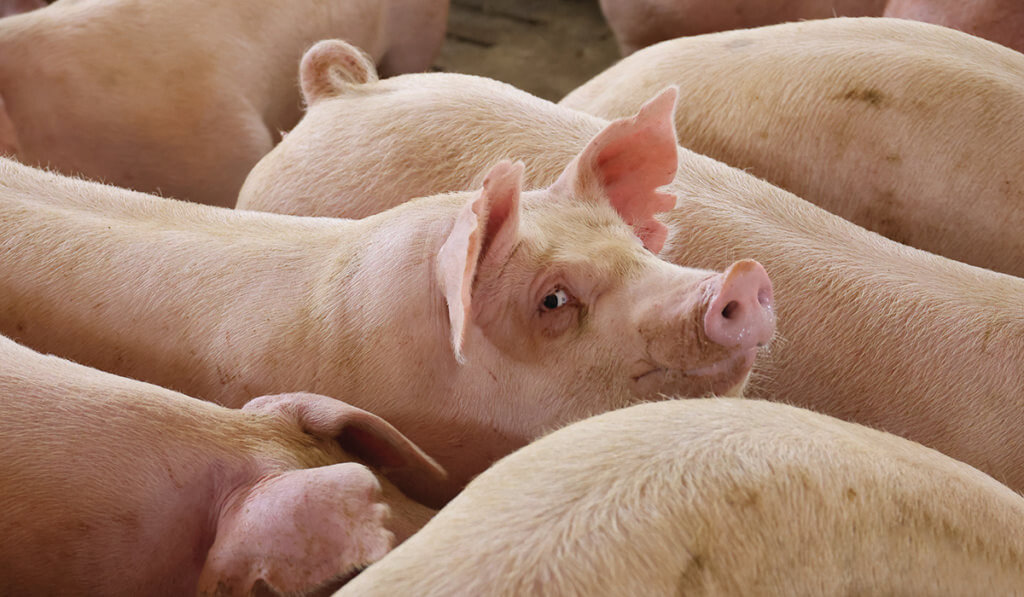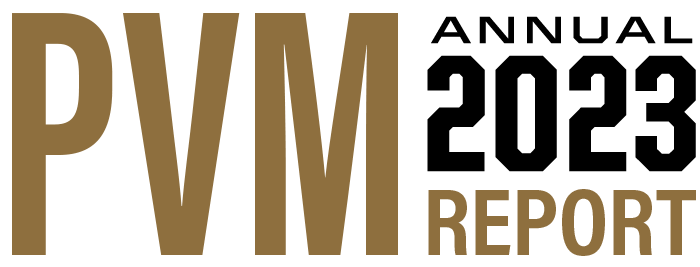
Diagnostic data from the Indiana Animal Disease Diagnostic Laboratory at the Purdue University College of Veterinary Medicine now is being included in the Swine Disease Reporting System (SDRS), which monitors and reports diagnostic data and trends from endemic diseases of the U.S. swine herd. The development comes on the heels of the college achieving a funding breakthrough for the ADDL during the State of Indiana’s biennial budget process.
For the first time in many years, the ADDL received a significant funding increase as the state raised the ADDL’s recurring appropriation by 35% as part of a new two-year appropriations budget adopted by the Indiana General Assembly in 2023. The vital added funding will further enable the ADDL and its Heeke Laboratory in Southern Indiana to meet their mission of helping Indiana veterinarians, animal health officials, livestock producers, and animal owners in protecting the health of the animal population by providing prompt, accurate, and reliable diagnoses of animal diseases, including those that may affect the human population.
The ADDL’s participation in the SDRS adds an important element to the Swine Disease Surveillance Program, which was founded in 2017 with funding by the Swine Health Information Center (SHIC). With the addition of the ADDL as of September 2023, the data aggregated by the SDRS now represents more than 96% of all swine samples submitted for testing across six Veterinary Diagnostic Laboratories in
the U.S. that are members of the National Animal Health Laboratory Network (NAHLN).
The ADDL is a level 2 laboratory approved by NAHLN and as a new SDRS participant, joins with the other members, which include the Iowa State University VDL, University of Minnesota VDL, Kansas State University VDL, South Dakota State University Animal Disease Research and Diagnostic Laboratory, and Ohio Animal Disease and Diagnostic Laboratory. Purdue’s involvement in the SDRS began with the ADDL adding historical data from the lab per the protocol outlined in the swine disease surveillance project. The next phase will add data from ongoing test results. Through this process, the producer- and clientele-anonymized data will be combined into a uniquely structured statistical database housed at the SDRS.
According to the SHIC, including new veterinary diagnostic laboratories contributes to expanding the SDRS diagnostic test data by adding new regions. These acquisitions enhance the project’s representativeness and capability to rapidly identify emerging or re-emerging animal health threats and inform producers and veterinarians. Indiana stakeholders actively requested the inclusion of the ADDL, which annually receives more than 5,000 samples from hog farms in Indiana.
The SHIC states that SDRS staff will continue working on data aggregation, data mining, interpretation, and summaries. Data will be shared daily via online dashboards along with monthly PDF, audio, and video reports. Monthly domestic disease monitoring reports are provided through the SHIC newsletter and published on the SHIC website.
With state-of-the-art equipment in the hands of highly trained and dedicated staff, the ADDL provides reliable veterinary diagnostic testing to Indiana and the rest of the United States. The laboratory accessioned a total of 29,478 animal cases in 2022, with nearly 66% of those originating in Indiana, and 34% coming from out of state.
Indiana ranks fifth in the United States for pork production, and animal agriculture contributes more than $4 billion each year to Indiana’s economy. Indiana pork producers annually meet the pork needs of every person in Indiana, plus 15 million more people in the U.S., and five million more people around the world.
The ADDL is fully accredited by the American Association of Veterinary Laboratory Diagnosticians and serves as the official diagnostic laboratory for the State of Indiana. The ADDL offers a wide range of testing services in the specialty areas of aquaculture, avian, bacteriology and mycology, canine genetics, histology, immunohistochemistry, molecular diagnostics, pathology, parasitology, serology, toxicology, and virology.
In addition to being a member of NAHLN and the FDA Food Emergency Response Network, the ADDL serves an important role in the College of Veterinary Medicine’s educational programs, including the DVM and Veterinary Nursing programs, as well as residencies and traditional graduate degree programs in anatomical pathology, poultry diagnostic medicine, and microbiology.
The ADDL has a sizeable catalog of swine diagnostic tests that continues to grow and meet the diagnostic needs of swine veterinarians and producers. In addition to traditional serologic and microbial diagnostic methods, the ADDL continues to expand the offering of molecular diagnostic services through individual PCR assays and syndromic panels.
“The ADDL at Purdue University is pleased to join the SDRS network and looks forward to collaborating with other SDRS members in providing data for use in disease prevention and biosecurity, and disease monitoring, management and forecasting,” said the ADDL director, Dr. Kenitra Hendrix, who also is clinical associate professor of veterinary diagnostic microbiology.
The SDRS project, managed through the Iowa State University College of Veterinary Medicine, is the only publicly available source of swine health information from U.S. animal disease labs including pathogen activity across all age groups, from boar studs to breeding herds to grow-finish pigs. The SDRS database contains information for PCR based detection of seven porcine endemic agents and more than one million cases since 2006. The SDRS is positioned as one of the largest U.S. and international databases for veterinary diagnostic information.
View the latest SDRS reports and dashboard at the Iowa State University Field Epidemiology Swine Disease Reporting System.

